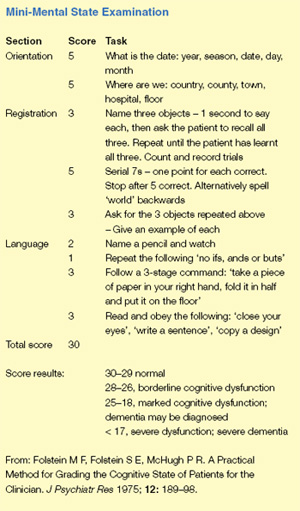Mini mental state exam
From Psy3241
The Mini Mental State Exam is a tool used to systematically asses mental status. It is based on 11 questions that test five areas of cognitive function. The five sections of the test are divided as follows: orientation, registration, attention and calculation. The maximum score is 30 and a score if 23 and lower indicates cognitive impairment. The test usually 5-10 minutes to administer, making it practical to use repeatedly.
Target Population
The Mini mental state exam is used as a screening tool for cognitive impairment in the older community of hospitalized adults such as nursing homes. The assessment of older adults’ cognitive function is believed to have better results if it is done routinely and thoroughly.
Strenghts and Limitations
The MMSE is an effective instrument to separate patients with cognitive deterioration from those without it. When used repeatedly the instrument is able to measure changes in cognitive status. It is important to note, that the tool is not able to diagnose the case for changes in cognitive function. As well, the instrument relies heavily on verbal responses, such as reading and writing. Consequently, patients that have a hearing or visual impairment may have low literacy when cognitively they might be intact.
References
Kurlowicz, L, & Wallace, M (1999). The Mini Mental Examination (MME). Try this: from the Hartford Institute for Geriatric Nursing, 1, Retrieved April 21, 2008, from http://www.chcr.brown.edu/MMSE.PDF
Mini-Mental State Examination. Psychological Assessment Resources, Inc. Retrieved April 20, 2008 from http://www.minimental.com/

